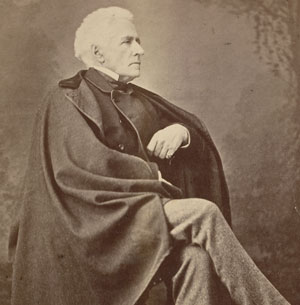Paul Strzelecki—a forgotten Polish hero of the Great Irish Famine
Published in Issue 3 (May/June 2019), News, Volume 27Exhibition, 9 May–30 August 2019, RIA, Dawson Street, Dublin.

Above: Count Paul Edward Strzelecki, c. 1870s. (State Library of Victoria)
Amidst the catastrophic horrors of Ireland’s Great Famine of 1845–50 a few bright examples of selfless humanitarianism shine through. One of these, little remembered in Ireland, was the Polish émigré Paul Edmund Strzelecki, known to many of his contemporaries simply as ‘the Count’. Arriving in Ireland in 1847, Strzelecki survived a bout of typhus fever to lead one of the most ambitious and successful charitable relief schemes, focusing on feeding one of the most vulnerable groups in society, the children of the rural poor.
Born near Poznán in the Prussian-occupied part of Poland in 1797 to a minor gentry family, Strzelecki left his country in 1829 following the failure of his attempts to establish himself as land agent to a princely family and a thwarted romance with a neighbouring landowner’s daughter. He would continue to correspond with his beloved Adyna Turno for the rest of his life, and much of what we know about him comes from these surviving letters. Strzelecki taught himself geology and mineralogy and, after several years in Britain, undertook a world tour in 1834, acting as a scientific explorer and surveyor. He returned to London in 1843 an acknowledged expert on Australian topography and society, and later published a book on the subject that was awarded a prize by the Royal Geographical Society.
In early 1847 Strzelecki, moved by accounts of intense human suffering in Ireland, offered to serve as a volunteer relief agent. The potato had first failed owing to the attack of blight in autumn 1845, but it was not until after the second and nearly universal potato failure of August 1846, and the increasing reports of deaths from starvation and disease in the later months of that year, that British and overseas charitable organisations began to raise funds and take direct action. Strzelecki’s friend, the banker Samuel Jones Loyd, was one of a number of men in the City of London who established the British Association for the Relief of Distress in Ireland and Scotland on 1 January 1847, and it was to this body that the Polish émigré applied. The British Association rapidly amassed some £470,000 (c. £41 million in today’s money) in large and small contributions from rich and poor alike in Britain and from overseas. It needed volunteer agents to ensure that its resources reached those most in need, however, and was quick to accept Strzelecki’s offer.
Strzelecki arrived in Connacht in February 1847, when the sheer scale of distress, rampant fever epidemic and absence of effective relief committees had plunged western districts into crisis. Based in Westport, he toured his distressed district of counties Mayo, Sligo and Donegal, recruiting Poor Law Inspectors to assist him, making grants of food aid and money to the maximum allowed and establishing soup kitchens, while constantly urging the London committee to give him more resources.
When many other British Association agents departed in summer 1847, Strzelecki offered to stay on and was appointed central agent for Ireland. Taking control of the island-wide operations of the Association, he now directed 40 military and naval officers working in the provinces. He recognised that children were amongst the most vulnerable to famine. He had tested the innovative idea of feeding children through schools in Westport, where he had provisioned 1,700 boys and girls in spring 1847. He now urged the committee to extend this mode of aid to all the impoverished Poor Law unions in the west. He stressed the humanitarian necessity of relieving ‘the helpless children, who, in the general run and scramble for food, have been left behind hungry by the way’, and the desirability of advancing their education and of keeping whole families out of the workhouse by removing parents’ anxieties for their children.
The committee agreed to Strzelecki’s requests for food and clothing and he set to work. By March 1848 nearly 200,000 children in the west were receiving meals in schools, mostly in the form of rye bread. Strzelecki’s co-workers were convinced that his intervention had saved many young lives. Unfortunately this action came to an end in July 1848, as the British Association’s funds ran out and the government chose not to continue it. Undaunted, Strzelecki personally raised another charitable fund in Britain after the next potato failure and returned to the west in June 1849, travelling 2,700 miles that summer to distribute aid where needed.
Returning to London, he was rewarded with a knighthood for his labours, but he explained his motivation as essentially humanitarian: ‘You cannot reason in an abstract way when you see men dying in the streets’.
Paul Strzelecki’s life and heroic action in Ireland are commemorated in an exhibition organised by the Polish Embassy in Dublin, which will be on display in the Meeting Room of the Royal Irish Academy from 9 May until 30 August 2019. For updates on other venues and dates please consult www.strzelecki.ie. All are welcome to attend a lunchtime lecture on Paul Strzelecki on Wednesday 12 June in the Royal Irish Academy delivered by the exhibition authors Prof. Peter Gray and Dr Emily Mark-FitzGerald.
















